2nd FIDE Olympiad for People with Disabilities reaches its midpoint
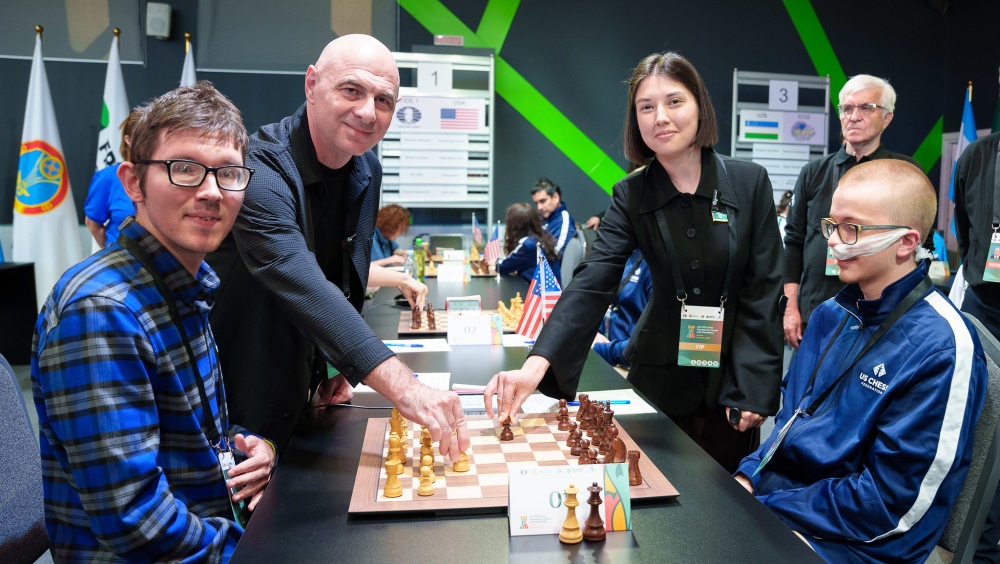
The 2nd FIDE Chess Olympiad for People with Disabilities in Astana has reached its half-way mark – the equator of this inspiring event. With Round 3 underway, the excitement and determination in the playing hall grow stronger each day. The first ceremonial move of the round was made by Dinara Naumova, Member of the Parliament of Kazakhstan, together with Akaki Iashvili, FIDE Special Tasks Director. “Before the first move, I spoke with the contestants – they were positive and confident. The atmosphere is wonderful, and the team spirit is inspiring,” said Dinara Naumova. “It’s an honour for Kazakhstan to host this event. I wish every player success and the strength to never give up. Team spirit makes us stronger.” Her words perfectly captured the spirit of the event – one of unity, resilience, and shared joy. The strength and spirit of the players Every participant at this Olympiad has a remarkable story. For them, every move on the board represents persistence, focus, and the triumph of the human spirit. Luisa Molina, from Team Colombia, shared her joy at being part of this inclusive event: “This Olympiad for People with Disabilities has been one of the best experiences we’ve ever had! This isn’t your usual event – it provides a space for inclusion.” Aryan Joshi from India, a first-time participant, was full of enthusiasm and optimism: “Feeling amazing – this is my first Olympiad for people with disabilities. Despite disabilities, despite the challenges on and off the board, everyone here is giving their best. Everyone is very friendly and very happy. Disability is not something that makes us less – we are differently able, not disabled.” Niloy Chakraborty, a coach for players with hearing impairments and an accompanying person at the event, emphasized the importance of opportunity: “I’ve worked with disabled students for a long time. I’ve shown them tournaments, helped them find opportunities, and organized many events for differently able teams. Here, everyone can participate – and they do, as equals.” Eugenio Campos, representing the IPCA team, coming from Angola, shared how chess became part of his life from a very young age: “This is a well-organized event; it gives us, players with disabilities, the opportunity to play against others from different countries. I thank IPCA, FIDE, and the Kazakhstan Chess Federation. I started chess when I was five – my cousin taught me, and since then, chess has meant a lot to me. Most of my life, I’ve played chess – it’s everything to me.” Another remarkable player of IPCA team is IM Igor Yarmonov from Ukraine, a five-time IPCA World Champion and International Master of both chess and chess composition. His wife and accompanying person, Galina Yarmonova shared: “We are grateful to all the organisers, volunteers, and staff for the wonderful atmosphere in Astana, for the excellent conditions for the players and their companions – everything is of the highest standard! This is our first time at such an Olympiad, and we thank the referees and volunteers for their kind, individual approach to each player.” “Throughout Igor’s life, chess has helped him overcome challenges and see the world – and we are happy to represent this big chess family,” she added. Even after the event, Igor continues contributing to the chess world as a judge for multi-move problems in the FIDE Album – evaluating compositions from around the globe. Inspiration beyond the board Every player finds their own motivation to keep going, and we asked, “Who is your favourite chess player in history?” Answers came quickly and with admiration: Magnus Carlsen, José Capablanca, Garry Kasparov, Anatoly Karpov, Bobby Fischer, and Mikhail Tal were among the most mentioned. But one response stood out. Jesús Osorio from Panama said: “My favourite chess player is not a famous person, but he is a very good chess player – my friend Osvaldo Herrera Graham.” A beautiful reminder that inspiration doesn’t only come from world champions, but also from those who encourage us personally – friends, coaches, and loved ones who share the same passion. The battle for the top Position of the day Today’s Position of the Day came from the exciting battle between Syed Ejaz Husain (Bangladesh) and Ben Kaufmann (Germany). Although Black’s position was slightly worse, they could still defend with 20…Nd6, trading off White’s active knight on f5. Instead, 20…Ne6?? was played, ignoring of White’s mounting kingside pressure. White immediately took advantage with 21. Ne5!, and after 21…Ra6?!, taking no heed of danger, came 22. Qg4 — launching a decisive attack. Black tried 22…Kh7, defeinding h6, but the storm was already breaking. White delivered a stunning blow 23. Nxh6!!, a brilliant sacrifice that ripped open Black’s kingside. After 23…gxh6 24. Qf5+ Kg8 25. Qxf7+ Kh8 26. Ng6#, it was checkmate. This brilliant finish reminds us of one of the great lessons of chess — and life: sometimes, you must take risks and trust your calculation. Evaluating, understanding, and acting with courage can lead to victory both on and off the board. Looking ahead As the Olympiad crosses its midpoint, the energy in Astana continues to rise. Every player here proves that chess is not only a sport of the mind, but a triumph of spirit, inclusion, and shared humanity. The standings after Round 3 and pairings for Round 4 can be found here: Chess Results – 2nd FIDE Chess Olympiad for People with Disabilities Official website: dis-olympiad2025.fide.com/
FIDE President Statement
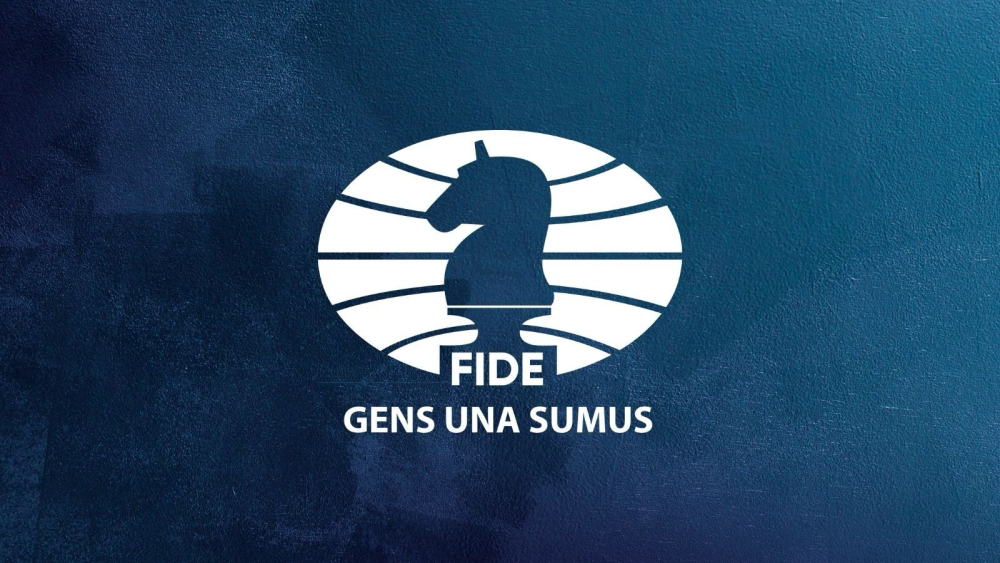
Human life and dignity are fundamental values shared by all of us. While we hold deep respect and love for the game of chess that unites our community, these values must always come first. In recent times, public debate within the chess world has too often moved beyond the boundaries of acceptable, harming not only people’s reputation but their very well-being. When this happens, discussions can turn into harassment, bullying, and personal attacks — a particularly serious concern in today’s environment. The chess community has long respected the achievements of GM Vladimir Kramnik, and his contributions to our sport are undeniable. The same high standards that accompany great achievements, however, also confer a responsibility to uphold the principles of fairness and respect and to be ambassadors for the sport. Therefore, I, along with the FIDE Management Board, will formally refer all relevant public statements made by GM Vladimir Kramnik — both before and after the tragic death of GM Daniel Naroditsky — to the FIDE Ethics and Disciplinary Commission for independent consideration. At the same time, I reaffirm that FIDE will take appropriate action in any case where a lack of respect, public harassment, or bullying is observed within the chess community. We all share responsibility for ensuring that our sport remains a space of integrity, respect, and humanity — values that must always prevail over hostility and division. Arkady Dvorkovich, FIDE President
Turkic world: A joint move toward chess unity
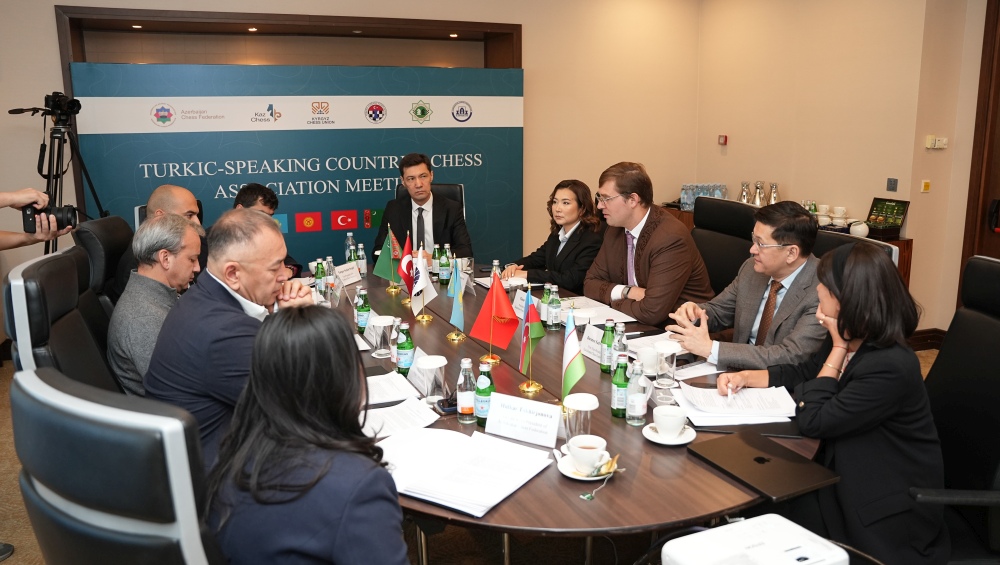
A memorandum to establish the Chess Association of Turkic-Speaking Countries signed in Astana, Kazakhstan On October 20, 2025, in Astana, representatives of Kazakhstan, Turkey, Azerbaijan, Kyrgyzstan, Turkmenistan, and Uzbekistan signed a Memorandum of Intent to establish the Chess Association of Turkic-Speaking Countries (TSCCA). This document formalizes the creation of a new structure designed to unite the chess federations of the Turkic world. The next step will be the legal registration of the TSCCA, paving the way for its full operational launch. The candidacy of Ilaha Gadimova (pictured below, right), a former prominent chess player from Azerbaijan and now a sports official, has been proposed for the position of TSCCA Secretary General. The idea for the association was conceived in September 2024 during the 45th Chess Olympiad and the FIDE General Assembly in Budapest. The participating countries agreed then to collaborate on developing a structure affiliated with FIDE. The association aims to strengthen ties between national chess federations, exchange experience and ideas, organize major tournaments, and develop programs for children and youth. Special attention will be given to promoting chess in schools and universities to inspire a new generation of players. The memorandum was signed in a ceremonial setting on the eve of the 2nd Chess Olympiad for People with Disabilities. The event was attended by Arkady Dvorkovich, President of FIDE, and Timur Turlov, President of the Kazakhstan Chess Federation. “The Turkic world is rich in chess traditions, great names, and strong schools. Now we have a common platform that will allow us to unite our efforts, share experience, and nurture a new generation of champions. This project brings us together not only through sport but also through our shared history and culture — which is why I am confident in its success,” said Timur Turlov. The association’s headquarters are planned for Turkistan, the cultural capital of the Turkic world. Turkey will chair the association until the end of 2025, with Kazakhstan assuming the leadership starting in 2026. The member countries represent a region with a population of around 170 million people and are home to over 100 grandmasters. The creation of the TSCCA is expected to significantly strengthen the chess movement across the Turkic world and enhance its collective presence on the global chess stage.
World Senior Championships 2025 commence in Gallipoli, Italy
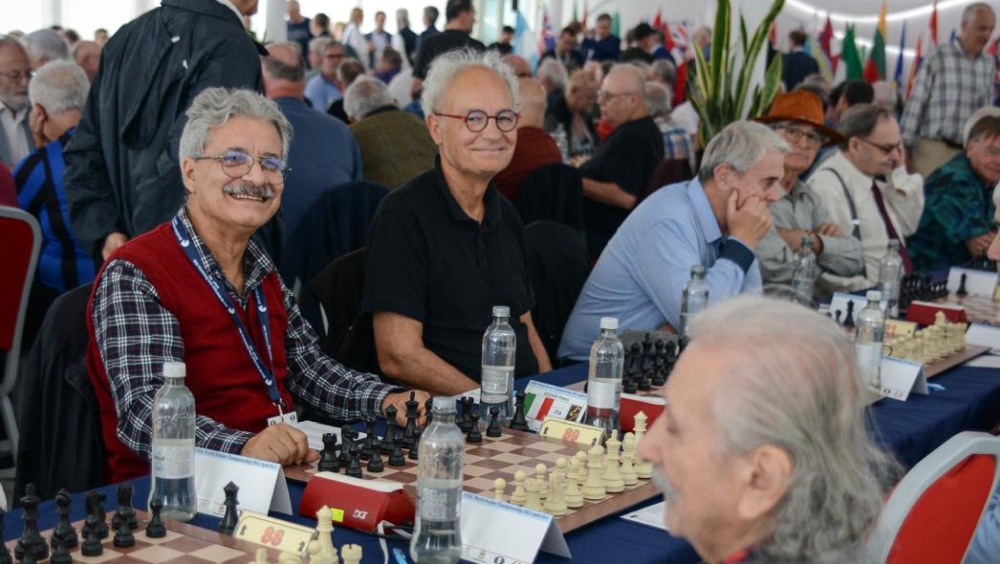
The 33rd FIDE World Senior Championships kicked off in the Grand Hotel Costa Brada, Gallipoli, Puglia, Italy, on October 21. The 2025 edition has set a new record, with 467 players participating. The players come from 67 different countries, with some even traveling halfway around the globe, flying in from New Zealand, South America, and South Africa. Of these, 55 participants are competing in the women’s competitions. The largest field is in the 65+ seniors category, with 247 players taking part. The championships are played as 11-round Swiss-system tournaments with classical time control (90 minutes plus a 30-second increment per move) and feature four categories: Open and Women’s sections for the 50+ and 65+ age groups. Four 2500+ GMs – Kiril Georgiev (BUL, 2526), Murtas Kazhgaleyev (KAZ, 2518), Alexandre Qashashvili (GEO, 2505), and Victor Mikhalevski (ISR, 2504) – headline the 50+ Open section, while reigning European Senior Champion GM Zurab Sturua (GEO, 2491) leads the 65+ Open starting list. GMs Pia Cramling (SWE, 2403), Ketevan Arakhamia-Grant (SCO, 2269; pictured above), IM Masha Klinova (ISR, 2235), and Monica Calzetta Ruiz (ESP, 2221) enter the 50+ Women’s competition as the top seeds. The legendary Nona Gaprindashvili tops the 65+ Women’s starting list. In recognition of the record turnout, FIDE has increased the total prize fund from €43,000 to €50,000. The category winners will receive: €5,000 (Open 50+), €2,100 (Women 50+), €3,000 (Open 65+), and €1,500 (Women 65+). In addition, the champions will be awarded free entry and complimentary hotel accommodation at the 3rd Cap Negret Senior Open (50+ and 65+), taking place from November 8–16, 2025, in Altea, Alicante, Spain. Special prizes for players aged 75 and above have also been increased. Several side activities will complement the main event, including two FIDE-rated blitz tournaments. The opening ceremony commenced with the playing of the Italian national anthem and the FIDE anthem, with all participants rising in a festive gesture. The competitions were officially opened by Tournament Director Cristina Rigo, co-organizer Matteo Zoldan (Chairman, WSCC 2025), and Yana Sidorchuk (FIDE Technical Delegate), who attended as the representative of FIDE. FIDE President Arkady Dvorkovich is expected to attend the award ceremony on November 1. Patrick Van Hoolandt (AC Chair) from Monaco delivered a welcome speech, wishing all participants wonderful experiences, new friendships, and many unforgettable memories throughout the tournament. Chief Arbiter Arno Eliens from the Netherlands reviewed the rules and officially signaled the start of the first round. Full results and pairings are available on Chess-Results. Official website: worldseniorchampionship2025.com/
2nd FIDE Chess Olympiad for People with Disabilities, Day 2: A celebration of strength, connection, and power of chess
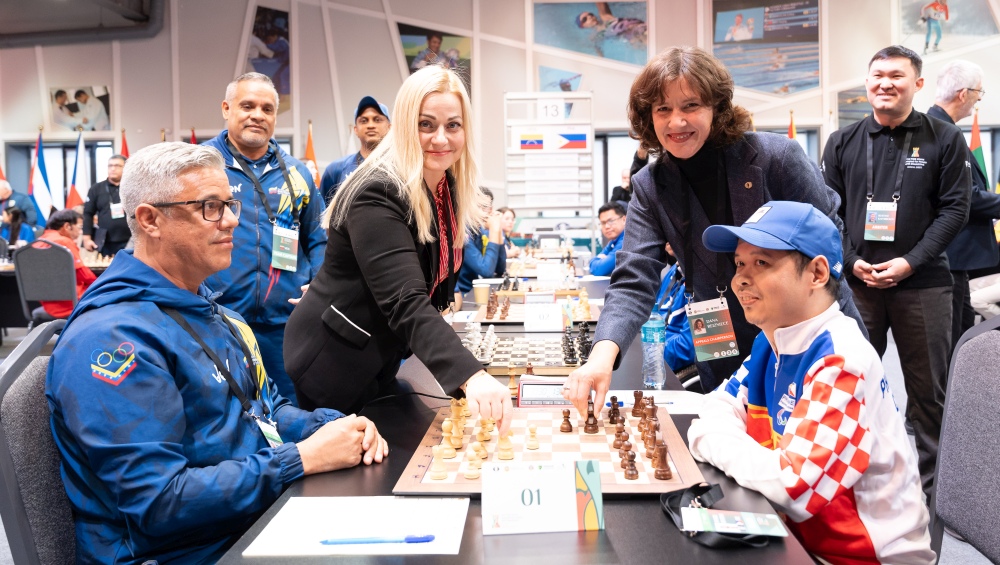
The atmosphere at the Paralympic Training Centre in Astana remains full of energy and inspiration as the 2nd FIDE Chess Olympiad for People with Disabilities continues into its second day. For many players, simply being here is already a victory – a triumph of willpower and perseverance over life’s challenges. Each move made across the chessboards carries a deeper meaning: determination, pride, and unity. Ceremonial first move with a message At the start of Round 2, the ceremonial first move was made by the Ambassador of Venezuela to Kazakhstan, Rosalba Lo Bué Antico, together with FIDE Deputy Chair of the Management Board, WGM Dana Reizniece. Ambassador Lo Bué Antico shared a heartfelt message about the event’s importance: “Today, in this 2nd Paralympiad for People with Disabilities, we see with great promise the possibility that Venezuela can develop major projects to promote chess – not only for people with disabilities, but also through educational programs in Venezuelan schools. Kazakhstan is a worthy example for Venezuela and the world.” Her words reflected the spirit of the Olympiad – an event that transcends competition and aims to make chess a global force for inclusion and opportunity. Dana Reizniece, who also made the ceremonial first move, expressed deep admiration for the players and organizers: “For me, it is not only 34 teams representing countries – for me, it’s 34 teams of people who are champions of their lives. They have a super strong character, and they are very humble. When you speak with them, you see it.” She praised the work behind the event’s organization: “The local organizers here in Kazakhstan made it possible not only with finances – thanks to Freedom Finance, the Kazakhstan Chess Federation, Astana Municipality, and the Government – but also by being brave enough to organize such an event.” Reflecting on the Olympiad’s evolution, Dana Reizniece added: “Many things have been improved. We know that there are many things that we can do even better – for example, invite more teams and provide this opportunity to play for even more countries worldwide.” And on the inclusivity of chess, she concluded: “Chess is, if not the, then one of the most inclusive sports – where people with disabilities or special abilities can play at the same level as professional players who have dedicated their whole lives to the game.” Inside the venue: Focus, friendship, and power of chess The Paralympic Training Centre in Astana – one of the most advanced accessible sports facilities in Central Asia – has become not only the stage for intense chess battles, but also a welcoming home for connection and community. Beyond the playing hall, the resting area offers players a place to relax, analyze games, and socialize. The atmosphere is warm and uplifting – filled with conversation, laughter, and mutual respect. When asked to describe chess in one word, players offered answers that capture the essence of the game:“Life. Love. Luck. Tenacity. Enjoyment. Pressure. Emotion. Equality.” For many, chess has been more than just a sport – it’s been a lifeline. As Roberto Fernando Elías, the Argentinian Chess Champion for the Blind, shared: “I’ve had my disability since the age of six. I believe that chess helped me avoid isolation and dedicate my time to a wonderful sport like chess. I’d like to express my gratitude to FIDE for creating this event.” His words mirror the feelings of many players who see this Olympiad as not only a competition, but a celebration – a place where friendships are formed and the joy of chess shines through. Position of the day: The art of trading pieces Many players believe that trading pieces leads to equality or draws. However, as today’s position of the day shows, every trade must be carefully evaluated. In the game between Axadxon Kimsanboyev (Uzbekistan) and Valeria Simone (Argentina), a critical mome nt arose: Black offered a bishop trade with 21. … Be5? to defend her d6-paw (21…Re5, sacrificing an exchange was a better option). Although logical, this decision proved costly – after the bishops exchange 22. Bxe5 Rxe5 the rook was kicked from the e5 with 23. f4 Re7 while Black’s dark-square became extremely vulnerable. A precise knight jump to f6 – 24. Nf6+ Kg7?, followed by 25. Qc3, sealed the fate of the game and the Argentinean player resigned, facing deadly threats. This instructive moment reminded everyone that in chess – as in life – not all trades are equal. Every exchange carries consequences, and true mastery lies in knowing when to simplify and when to keep the tension. Round 2 results After two rounds, seven teams – Poland, USA, Cuba, Israel, Philippines, IBCA, and FIDE 1 – are in the lead with a perfect 4/4 score. Full results and pairings for Round 3 are available on Chess-Results. A message beyond the board As the 2nd FIDE Chess Olympiad for People with Disabilities unfolds, it continues to highlight the unifying power of chess – a game where every move counts, and every participant inspires. For the players, organizers, and everyone watching, the message is clear: The board has no boundaries – and the spirit of the game belongs to everyone. Official website: dis-olympiad2025.fide.com/
India makes its move: Goa CM Pramod Sawant unveils FIDE World Cup 2025 logo and anthem
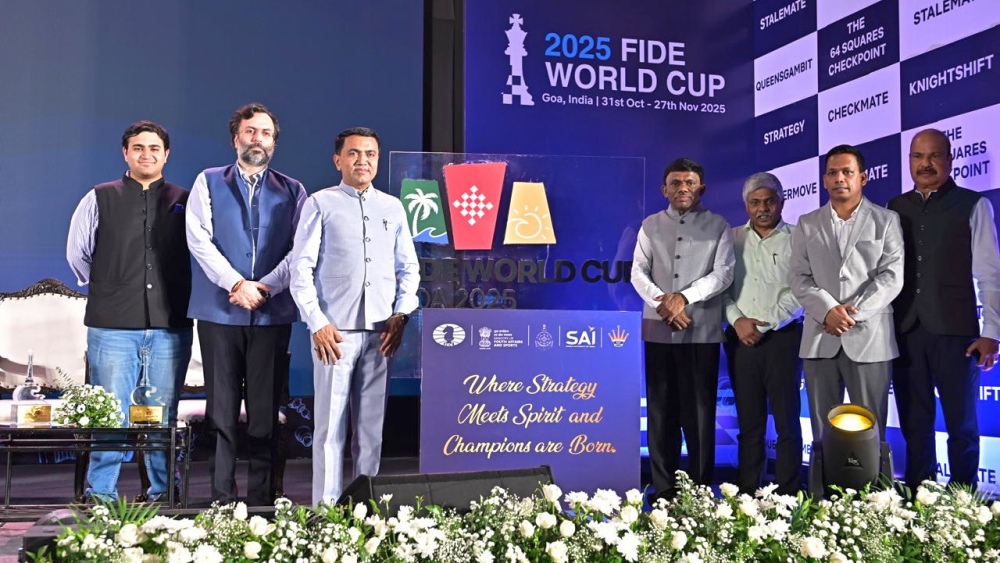
206 players from 82 countries to compete as music legend Daler Mehndi lends his voice to an anthem celebrating Goa’s cultural flair Panaji, October 21: A glittering ceremony celebrating Goa’s rich cultural heritage and India’s growing stature as a global chess powerhouse marked the launch of the official logo and anthem of the FIDE World Cup 2025, unveiled by Hon’ble Chief Minister Dr. Pramod Sawant in Goa on Tuesday. Returning to India after 23 years, the prestigious tournament will feature 206 players from 82 countries, with the anthem—voiced by music legend Daler Mehndi—capturing the spirit and vibrancy of Goa. The FIDE World Cup 2025, one of the most prestigious tournaments on the global chess calendar, will be held in North Goa from October 31 to November 27, 2025, bringing together elite players from across the world in a knockout contest for a prize purse of USD 2 million (approx. INR 17.58 crore). While the logo reflects Goa’s vibrant, culturally rich identity—capturing the essence of the state’s coastal charm and the strategic elegance of chess—the anthem, sung by legendary artist Daler Mehndi, adds a touch of grandeur and mystique to the event. Speaking at the launch ceremony, Honb’le Goa Chief Minister Dr Pramod Sawant said, “It is a moment of immense pride for Goa to host the FIDE World Cup 2025, one of the most prestigious events in global chess. This milestone not only reaffirms our state’s commitment to becoming a premier destination for international sport but also celebrates India’s rising prominence on the world chess stage. The official logo and anthem reflect the very soul of Goa — vibrant, creative, and deeply rooted in culture — while capturing the strategic elegance of chess. We are ready to welcome the world’s finest players to our shores for 28 days of top-class competition, camaraderie, and an experience that blends the spirit of Goa with the brilliance of the game.” The logo and anthem launch was also attended by Dr. Ramesh Tawadkar, Minister for Art and Culture, Tribal Welfare, and Sports and Youth Affairs, Nitin Narang, President of the All India Chess Federation (AICF) and Dev Patel, Secretary AICF. Dr. Ramesh Tawadkar, Minister for Art and Culture, Tribal Welfare, and Sports and Youth Affairs, said, “The FIDE World Cup 2025 is a remarkable opportunity to bring together culture, art, tourism, and sports on one grand stage. Goa has always been known for its vibrant heritage and hospitality, and this event will showcase how seamlessly our cultural identity blends with the global spirit of competition. The World Cup will stand as a testament to Goa’s ability to celebrate excellence — on and off the chessboard — while promoting our state as a world-class destination for sport and tourism.” Complementing the visual identity of the event is its official anthem — a dynamic celebration of India’s strategic prowess and youthful energy. Featuring the Hon’ble Prime Minister in its music video, the anthem brings together the spirit of the nation with the brilliance of chess. Iconic singer Daler Mehndi, known for his powerful and distinctive voice, infuses the anthem with his signature vibrancy, rhythm, and energy. Centered around the empowering theme “It’s Your Move,” the song captures the essence of India’s growing might in world chess while highlighting the vibrancy of its culture. The video also showcases India’s leading chess grandmasters and stars like World Champion D. Gukesh, Arjun Erigaisi, Koneru Humpy, Tania Sachdev, and Vidit Gujarati, symbolizing the new generation that is taking Indian chess to unprecedented heights. AICF President Nitin Narang thanked the Goa government for their support for the event and said, “Securing the hosting rights for the FIDE World Cup 2025 is a landmark moment for India and a testament to our growing credibility in the global chess community. Bringing a tournament of this magnitude to our shores — after 23 years — is not just a sporting success, but a proud national achievement. It will give Indian fans a rare opportunity to witness the world’s best players compete on home soil, inspiring a new generation to take up the sport. The anthem, with its energy and emotion, will revitalize chess across the country and take the game from clubs and academies into every home in India.” About the World Cup 2025 logo The logo feature three distinctive trapezoidal panels, the design captures different facets of Goa and the tournament itself. The Green Panel shows a white palm tree with a blue wave at the bottom. The Red Panel boasts of a diamond-shaped checkerboard pattern in white while the Yellow panel has a stylised sun with curved rays, representing Goa’s sunny weather and warm, welcoming vibe.
Daniel Naroditsky (1995–2025)

Born on 9 November 1995 in San Mateo, California, Daniel Naroditsky became a prominent Grandmaster, author, coach and streamer whose influence extended far beyond the chessboard. He died just two weeks before his 30th birthday. Chess entered his life at the age of six, when his older brother, Alan, brought several board games to entertain children at a party. Their father, Vladimir, an immigrant from Ukraine, taught them how to play chess. “I think a lot of people want to imagine that it was love at first sight and that my brother couldn’t pull me away from the chessboard… It was more of a gradual process, where chess slowly entered the battery of stuff we did to pass the time. A lot of my best memories are just doing stuff with my brother,” he told the New York Times in 2022, in an article announcing that he would be writing a chess column for the paper. Beyond chess, basketball was another of Naroditsky’s favorite sports. Like most players destined for success, Daniel Naroditsky began making his mark early. In 2007, he earned the FIDE Master title and won the U-12 section of the World Youth Chess Championship. He shared second place at the 2010 US Open, became an International Master in 2011, and won the US Junior Championship in 2013. That same year, he achieved the title of Grandmaster. His peak FIDE classical rating was 2647, reached in May 2017. Naroditsky was also an exceptional blitz and rapid player. He competed in major national and international events while simultaneously making a path for himself outside of chess, graduating with a degree in history from Stanford University. But Naroditsky’s greatest gift to chess was his ability to explain the game to those who were just starting to discover Caissa’s world. He was a teacher at the Charlotte Chess Center, and also had private students. He authored several books on chess, starting with Mastering Positional Chess which he published at the age of 14 – having begun writing it when he was just ten years old. Naroditsky often appeared as a commentator for prominent chess events, most notably on Chess.com, and also ran highly popular Twitch and YouTube channels. He was praised for the ability to calmly and simply explain the game to players of all levels. From 2014 to 2020 he also wrote a column for Chess Life. Naroditsky’s unexpected passing was announced on X by his family via the Charlotte Chess Centre. Chess players around the world spoke out following the news of Naroditsky’s death, praising him as a skilled player, a gifted educator and a generous spirit. Beyond the chessboard, Naroditsky played a pivotal role in popularizing chess content online, bridging the gap between professional and amateur chess. Speaking to the New York Times in 2022, he summed up his view of chess – and life – in the following well-known quote: “At the end of the game, both the king and the pawn go into the same box.” There are not many people in the world who manage to achieve so much before turning 30. Grandmaster Daniel Naroditsky will forever be among them. Written by Milan Dinic Photos: Maria Emelianova, Lennart Ootes and Michal Walusza
FIDE Olympiad for People with Disabilities, Day 1: A celebration of inclusivity and determination
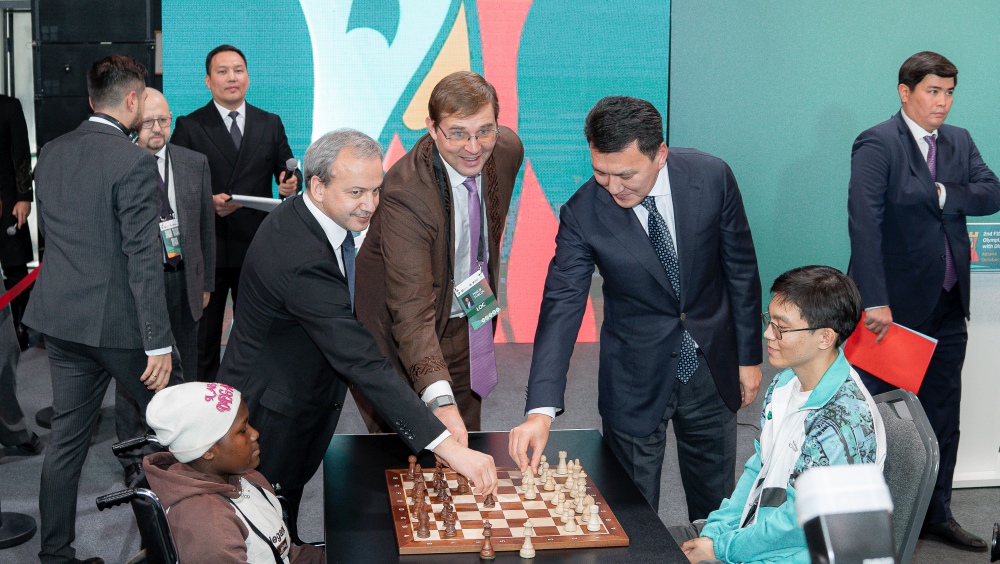
The 2nd FIDE Olympiad for People with Disabilities officially began in Astana, Kazakhstan, bringing together 34 teams from 29 countries. Additionally, eight more nations are represented through the teams of the IPCA (International Physically Disabled Chess Association), IBCA (International Blind Chess Association), and ICCD (International Committee of Silent Chess) — making it a truly global event, with participants from 37 countries in total. The games are hosted at the Paralympic Training Centre, one of the most advanced and accessible sports facilities in Central Asia. With two spacious playing halls, the venue offers perfect and comfortable conditions for all participants, reflecting the Olympiad’s core message of inclusion and equal opportunity. Opening ceremony The opening ceremony was held in a warm and inspiring atmosphere, attended by dignitaries, players, and guests who celebrated the start of this unique event. In the main playing hall, the first ceremonial move was made by Erlan Karin, State Counsellor of the Republic of Kazakhstan; Arkady Dvorkovich, President of FIDE; and Timur Turlov, President of the Kazakhstan Chess Federation. Timur Turlov spoke about the significance of this Olympiad, saying: “Chess is a great symbol of equality and an opportunity to play across the globe. Having differences doesn’t change that – chess unites.” In the second playing hall, the first move was performed by Baglana Musina, President of the Corporate Fund Freedom Shapagat; Oscar Santana Leon, Ambassador of Cuba; and Dmitriy Balandin, Olympic Swimming Champion. FIDE President Arkady Dvorkovich emphasized the importance of inclusivity in chess, noting that this Olympiad stands as a model of equal opportunity: “Chess is inclusive, and we must ensure that everyone has access to top events. The Olympiad for People with Disabilities proves that we are creating those opportunities for all.” He also highlighted FIDE’s broader commitment to social initiatives around the world: “Through projects like Chess for Refugees, Chess for Freedom, and Chess for Children with Autism, we’re showing that chess is truly for everyone. This Olympiad is our flagship event – a reminder that chess is accessible and brings happiness to all who play it.” Voices of the 2nd Olympiad for People with Disabilities The Olympiad is not only about the results – it’s about people and their stories. Every participant brings a story of resilience, courage, and passion for the game. Shantel Panashe Gweshe from Zimbabwe, a social worker and first-time Olympiad participant, shared her experience: “It’s my first time coming all the way from Zimbabwe, participating in this Olympiad. What I have seen here – there’s so much inclusivity for people living with disabilities. When I go back to Zimbabwe, the first thing I’m going to do is empower other people with disabilities to ensure inclusivity and participation.” Meanwhile, Henry Lopez from the Philippines (pictured above), who won a bronze medal at the first Olympiad in Serbia in 2023, reflected on how deeply chess has shaped his life: “Chess for me now is my source of living. I am a national team player in the Philippines, and I receive a stipend from the government. Chess is a universal language – it’s a great equalizer. No matter how old or young you are, or whether you have a disability, you can play. Chess is for everybody.” With determination in his voice, Henry added: “At the previous Olympiad, we got third – this time, frankly speaking, we are aiming for number one.” This is what the FIDE Olympiad for People with Disabilities is truly about – gathering players from all around the world, giving them opportunities to show the power of their minds, and celebrating the unifying strength of chess. Games and results The first round brought exciting games and strong performances by the top teams. Almost all favorites won their matches convincingly. Uzbekistan, India, Venezuela, and FIDE 1 began their campaigns with impressive 4–0 victories. There were, however, two notable ties: North Macedonia held the Czech Republic to a 2–2 draw, and ICCD (International Committee of Silent Chess) also drew with Argentina. You can find all results, pairings, and standings after the first round on Chess-Results: s3.chess-results.com/tnr1276749.aspx?lan=1&art=0&rd=1&SNode=S0 Side events in Astana In addition to the competition, today featured two important milestones for the global chess community. A Memorandum on Declaring 2026 the Year of Chess in Education was signed between FIDE President Arkady Dvorkovich and President of the International School Chess Federation Timur Turlov, who also leads the Kazakhstan Chess Federation. Following the signing, Timur Turlov said: “I hope that it will help a lot of kids to discover themselves better – to train their ability for strategic thinking, to keep concentration, to build clubs, and to make friends across the globe.” FIDE President Arkady Dvorkovich highlighted that this initiative aims to significantly expand chess participation among young people: “Our goal is to double the number of children playing chess worldwide, and our partnership with the International School Chess Federation will help us make that a reality.” Another memorandum was signed between Turkey, Kazakhstan, Uzbekistan, Turkmenistan, and Kyrgyzstan, establishing an Association of Turkic-Speaking Countries. This new initiative aims to bring the work of these nations closer together, strengthening cooperation in chess development and the organization of joint events. A celebration of unity and inclusion The first day of the 2nd FIDE Olympiad for People with Disabilities set the tone for a remarkable event – one that celebrates not only competitive excellence, but also the human values of inclusion, equality, and respect. The Paralympic Training Centre in Astana has become a home for players from all corners of the world, united by one timeless truth: chess is for everyone. Official website: dis-olympiad2025.fide.com/
Arkady Dvorkovich’s interview for ChessBase India

The FIDE President discussed the Total Chess World Championship Tour, changes to the 400-point Rating rule, the success of the Year of Social Chess, and the state of FIDE. In an online interview with Sagar Shah of ChessBase India, one of the leading chess media outlets, Arkady Dvorkovich highlighted the importance and the role of the new Total Chess World Championship Tour which was recently announced by FIDE. “FIDE has for a long time been thinking about a new format where we can combine different time controls and adjust to the reality of the faster, digital world, but also reflect the existing high interest in classical and blitz chess. We were happy that Norway Chess came up with the initiative to do something like that. It was the right time, the right moment and the right partners. From the very beginning, we had a clear understanding that we can do it only together,” Dvorkovich said. “We do believe this [project] will bring many new spectators and excitement to the players. Most of the top players believe that it is a very interesting format”. Dvorkovich emphasized FIDE’s position that the classical world championship title “is the most important one… but we believe it is the right time to increase the importance of other formats as well”. The new partnership with Norway Chess is a long-term commitment, based on an eight-year contract with an option to renew for an extended period. “I do believe that – based on the concept that we have – it will be at least equally important as Rapid and Blitz, but potentially much bigger,” Dvorkovich added. On the subject of how the rising number of global chess events in a year has an impact on the annual chess calendar, Dvorkovich said that “in an ideal world, we should have agreements with all top events and – like in tennis – put them in a universal tour where every top event will count, but that’s not easy”. The FIDE President expressed a commitment to working with all partners to achieve a future ‘universal tour,’ similar to tennis, where every top event counts, and where a consensus on time control, aligned with the exciting World Cup format, can be reached. Chess in India “India is the motherland of chess, and everyone respects that. We always have at least one major event every year in India,” said Dvorkovich. When asked about the forthcoming World Cup in Goa – one of the longest events planned for this year, lasting nearly four weeks – the President of FIDE expressed his confidence in the All India Chess Federation and the local organisers, saying that progress [on organising this event] is made every day, adding that FIDE has “trust that everything will be fine”. Another major event towards the end of the year is the Tech Mahindra Global Chess League, which FIDE has a stake in. The event will take place in Mumbai in December. The media-friendly concept of the event has put a new spotlight on chess globally, and Dvorkovich expressed his support for the project, noting that it has become commercially sustainable. Photo: Aditya Sur Roy “I think it’s good that two big events are in India [this year]. Doha is also not far away, so it’s convenient [for those players participating in the World Rapid and Blitz at the end of the year]”. A more competitive approach to wild cards In recent years, FIDE has refined its approach to the use of ‘wild cards‘ – special invites that ensure the participation of both talented up-and-coming players and chess legends in top world events. “We always give chances to very young players because we can see their potential. This way, we are showing we are aware of the fast growth of these players. Also, we have it as a rule that we give wild cards to veterans”. The FIDE President noted that the approach to issuing the special invites has evolved. “We started using a competitive approach for wild cards, telling players that they can play against each other” to determine who will qualify. No “farming of rating” to be allowed Speaking about the recent targeted amendments to the FIDE Rating Regulations, Dvorkovich said that the organisation does “not allow farming of rating” by top players playing against significantly lower-rated opponents. Acknowledging that such a matchup is possible in an open event or an Olympiad, Dvorkovich noted that “many games like that” clearly suggest “it’s artificial”. “I think we found a good solution,” said Dvorkovich, noting that the goal of the change was never to prevent any player from qualifying for the Candidates. On the subject of FIDE rating in general, including in relation to the question of ratings of inactive players, Dvorkovich acknowledged that it is an “extremely difficult” complex system, with opinion polls and discussions showing a deep split in the chess community about any changes. “When we ask players, normally there is no consensus at all. But most players are not happy about keeping inactive ratings in the system. People do want ratings to reflect the real strength of players,” Dvorkovich said. From the Year of Social Chess to the Year of Chess in Education The interview also touched on the social initiatives, which have become one of the key tools in FIDE’s approach to engage the broader, non-professional, chess audience. “We showed the whole world that chess is a combination of a professional and a social mission to improve society”. Noting that the Year of Social Chess helped “many governments in the world see the social value of chess,” leading to them starting to provide more support for the game not just on a competitive basis but as a tool for social engagement and levelling. “Here we are not talking about medals but [about] society. From this perspective, the year was successful. It doesn’t mean we will finish those projects on the 31st of December – we will continue them. For next year, there is already an
FIDE and ISCF declare 2026 as the Year of Chess in Education
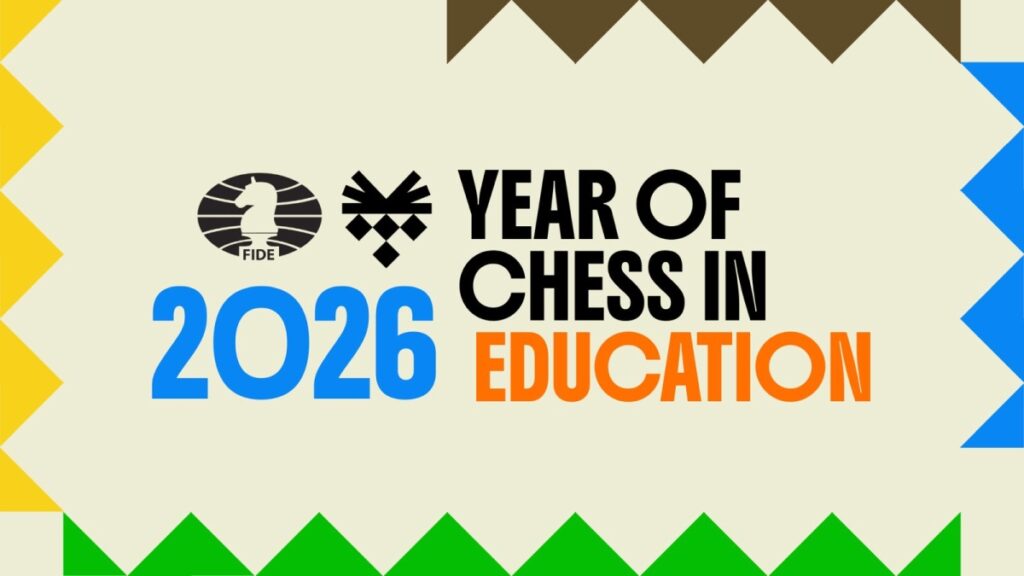
Following the Year of Social Chess, 2026 will be dedicated to chess in education, underscoring FIDE’s focus on integrating chess into the global school curricula worldwide. On 20 October, at NGS School in Astana, FIDE and the International School Chess Federation (ISCF) signed a Memorandum of Cooperation to jointly promote scholastic chess globally. The initiative builds upon the successful 2025 Year of Social Chess and aligns with FIDE President Arkady Dvorkovich’s proposal – made at the recent Smart Moves Summit in Washington, D.C. –to make education one of key focus areas for 2026. Under the agreement – which will guide future cooperation – ISCF will work closely with FIDE to organise a series of international school team tournaments under the name “World Schools Team Championship League 2026” (WSTCL), which will serve as a flagship event of the “Chess in Education 2026” programme. The tournaments will unfold in two stages: Continental Championships for Africa, the Americas, Asia and Europe. Grand Final featuring the winners of respective Continental Championships. The parties expressed their intent to draft an action plan for additional events alongside each WSTCL 2026 tournament, aiming to expand scholastic chess and promote chess as an educational tool. The memorandum was signed by FIDE President Arkady Dvorkovich and Timur Turlov, President of the International School Chess Federation. “Education is the foundation for a good and successful life, and chess is a proven and powerful tool to underpin that goal,” said FIDE President Arkady Dvorkovich. “Investment in chess education, youth and school events has been one of the goals of my team since taking the helm of FIDE. I am delighted that after a successful Year of Social Chess, we are continuing with the Year of Chess in Education, launching new projects and initiatives and getting more schools and educational facilities involved in chess.” The memorandum will serve as a foundation for implementing initiatives aimed at developing school chess and popularising intellectual sports in school education. “Inclusion and equal opportunities have always been close to my heart. With the backing of our Freedom Shapagat Foundation, we have consistently supported social initiatives that help children and promote a more compassionate and humane society. That is why hosting these initiatives within the framework of the FIDE Olympiad for People with Disabilities feels especially meaningful,” said Timur Turlov. “It is only natural that in this year — declared by FIDE as the Year of Social Chess — together with the International School Chess Federation, we take the next step and announce 2026 as the Year of Chess in Education. From early childhood, it is through learning that we build a society grounded in respect, empathy, and support for every child,” he added. The “Chess in Education 2026” initiative marks a major milestone in FIDE’s global efforts to promote chess as a valuable component of learning, supporting both cognitive and social development among students worldwide. About ISCF: The International School Chess Federation (ISCF) is dedicated to the global promotion and integration of chess within the educational system globally. Launched in September 2024 as a FIDE-affiliated organization, the ISCF operates as a main institutional platform for advancing chess in schools — developing educational programs, supporting national federations, and fostering cognitive and social growth among students through the game of chess.

